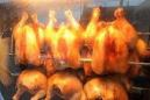Sales of rotisserie chicken have fallen by 18% since the government introduced VAT on hot foods last October, according to the British Poultry Council (BPC).

The VAT hike has resulted in supermarkets selling about 138,000 fewer rotisserie chickens each week
Before VAT was levied on October 1 2012, about 40M rotisserie chickens were sold in the UK each year. But in the 23 weeks since its introduction sales fell by about 18%, with 3.2M fewer chickens being sold over the period.
The 20% tax boosted the average price of a hot large plain chicken from pound 4.65 to pound 5.55. The hike resulted in supermarkets selling about 138,000 fewer rotisserie chickens each week or around 7.2M fewer a year.
The tax has netted the Treasury an extra pound 13.35M on sales during the period.
Peter Bradnock, BPC boss, said: “In a market where virtually all chickens sold are British, this is clearly having a detrimental effect on our farmers. We know that 70% of rotisserie customers actually consume their purchase cold, so this is unfairly penalising them. This ‘hot VAT’ isn’t raising huge sums for the Treasury but is having a major impact on hard-pressed families and British producers across the country.”
‘Reconsider its decision’
Morrisons urged the government to reconsider its decision to levy VAT on hot chickens.
Jamie Winter, the supermarket’s fresh food director, said: “We urged the government to reconsider this unfair tax on customers – who don’t even eat rotisserie chicken as a takeaway item – before it was even introduced in the budget back in March of last year.
“Not only does it cost shoppers more at a time when finances are already tight, there is clear evidence that the tax is also hurting British farmers. The government should support farmers and consumers by reversing this decision once and for all.”
The chancellor introduced plans to add VAT to all produce that is sold hot, classifying it as a take-away food in his last budget a year ago.
The Treasury’s initial proposals were revised to allow hot food left on the shelf to cool down to have a 0% VAT rate.





